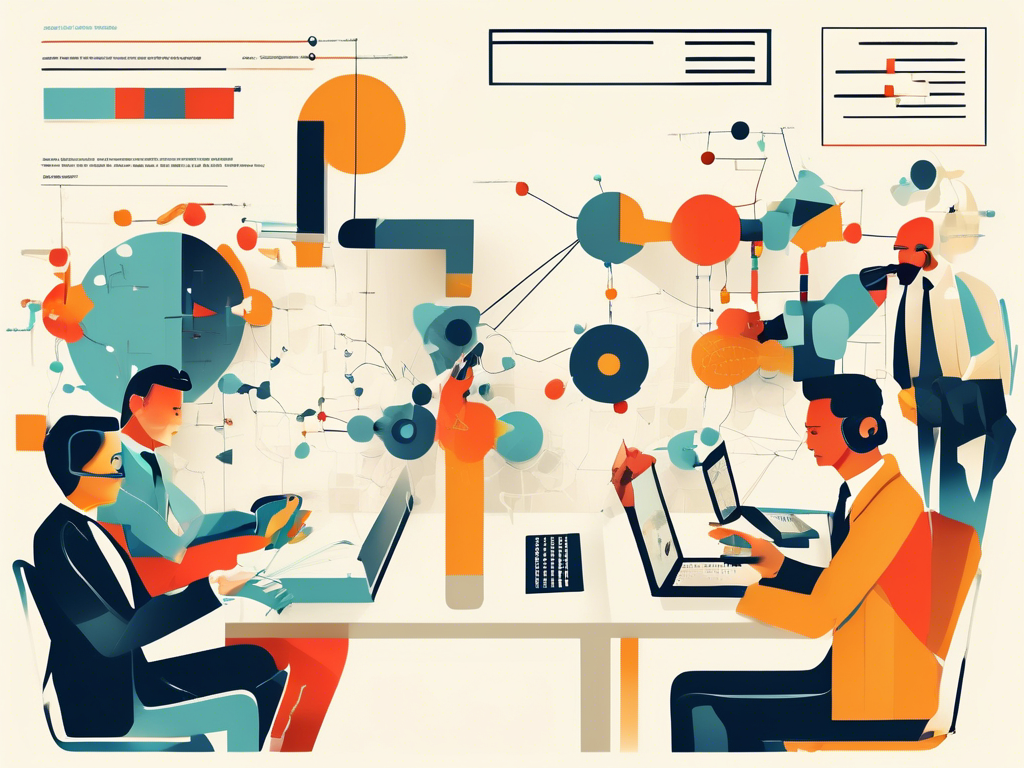In an era where technology is king, artificial intelligence (AI) reigns supreme, marking its territory in the domain of project management. From small-scale initiatives to grand corporate strategies, AI is not just a luxurious addition but a pivotal force in steering projects towards unprecedented levels of efficiency and success. As we dive into the influence of AI on project processes, we uncover its potent role in catalyzing project efficiency, shaping the future of project management with AI-driven solutions, revolutionizing project planning and execution, advancing beyond mere automation to sophisticated strategic decision making, and significantly boosting team collaboration and project success rates.
This dynamic rise of AI invites us to rethink how projects are managed and the tools used to facilitate this management. The integration of AI technologies in project management stands not only as an upgrade to existing methodologies but as a transformational shift that echoes across every layer of organizational operation. By embracing the nuances of AI’s capabilities, stakeholders can seize opportunities to align their tactical decisions with strategic objectives, fostering a harmonious blend of human expertise and machine intelligence. This article embarks on an exploratory journey to dissect the myriad ways in which AI is reshaping the project lifecycle—an endeavor that begins with anticipation and promises to end with innovation.
Exploring the Role of AI in Enhancing Project Efficiency

Streamlining Project Planning and Execution
The advent of Artificial Intelligence (AI) in project management has revolutionized how project planning and execution are approached. By leveraging AI algorithms, project managers can now predict outcomes more accurately, automate repetitive tasks, and allocate resources more efficiently. This not only speeds up the project life cycle but also enhances accuracy in project delivery. AI-driven tools help in identifying the best project methodologies and workflows, ensuring that projects are aligned with business objectives from the outset. Additionally, AI can analyze historical data to identify potential bottlenecks, enabling proactive measures to mitigate risks, which significantly improves project success rates.
—
Enhancing Collaboration and Communication
Effective collaboration and communication are pivotal for the success of any project. AI plays a crucial role in this aspect by providing platforms and tools that facilitate seamless interaction among team members, regardless of their geographical locations. Tools like AI-driven chatbots can offer instant responses to queries, schedule meetings, and even remind team members of impending deadlines, thus ensuring that everyone is on the same page. Furthermore, AI can analyze communication patterns to suggest improvements, making the teamwork more cohesive and efficient. This not only boosts the morale of the team but also leads to a more dynamic and flexible project management approach, adaptable to changes and capable of overcoming unforeseen challenges.
By harnessing the power of AI, project managers can significantly enhance project efficiency, leading to timely deliveries and higher quality outputs. The role of AI in project management is becoming increasingly indispensable, marking a paradigm shift in how projects are managed and executed in the digital age.
The Future of Project Management: AI-Driven Solutions
Automating Project Management Tasks
The integration of Artificial Intelligence (AI) in project management is set to take a giant leap forward by automating a broad spectrum of project management tasks. AI-driven automation will extend beyond simple task assignments and updates to encompass complex decision-making processes. For instance, AI algorithms can analyze project data in real-time, making instantaneous adjustments to project timelines or budgets as necessary. This level of automation will significantly reduce the manual effort required from project managers, allowing them to focus on strategy and innovation. Moreover, predictive analytics powered by AI can forecast project risks with high accuracy, enabling preemptive actions to be taken. This proactive approach to managing project challenges will drastically enhance project success rates and efficiency.
—
Personalizing the Project Management Experience
Another transformative impact of AI in project management is the personalization of the project management experience. By analyzing individual team member’s performance, preferences, and historical data, AI can tailor project tasks and communications to align with each member’s strengths and working style. This not only maximizes productivity but also significantly improves job satisfaction and team morale. Furthermore, AI-driven solutions can provide personalized training and development recommendations, ensuring that team members are continually evolving and improving their skills in alignment with project needs. This level of personalization ensures that the project team operates at peak efficiency, with each member contributing their best work towards the project goals. AI’s role in creating a more adaptive and responsive project management framework cannot be overstated, promising a future where projects are not only managed more efficiently but also more intuitively and human-centrically.
Artificial Intelligence in Project Management

Revolutionizing Resource Allocation and Optimization
The integration of Artificial Intelligence (AI) into project management has notably transformed resource allocation and optimization, a core aspect of project planning and execution. AI algorithms excel in analyzing vast datasets, enabling them to identify the most efficient ways to distribute resources—be it time, budget, or manpower—across various project activities. This ensures that resources are utilized in the most effective manner, significantly reducing wastage and improving project outcomes. Moreover, AI-driven tools can predict future resource requirements with remarkable accuracy, allowing for preemptive adjustments that keep projects on track and within budget. By automating and optimizing resource allocation, AI frees up project managers to focus on more strategic aspects of their projects, thereby enhancing overall productivity and efficiency.
—
Improving Decision Making with Predictive Analytics
One of the most significant advantages of deploying AI in project management is the enhancement of decision-making processes through predictive analytics. AI algorithms can sift through historical project data to identify patterns and trends, which can then be used to forecast future project outcomes. This capability enables project managers to make informed decisions, anticipate potential issues, and implement mitigation strategies before problems arise. Furthermore, AI can offer alternative solutions and simulate different scenarios, providing a comprehensive view of possible outcomes for each decision. This level of insight is invaluable for managing complex projects, as it significantly minimizes risks and prepares teams to handle challenges more effectively. Through predictive analytics, AI not only strengthens the decision-making process but also contributes to a more proactive and strategic approach to project planning and execution.
AI in Project Management: Beyond Automation to Strategic Decision Making
Enhancing Risk Management with AI’s Predictive Power
The use of Artificial Intelligence (AI) in project management extends far beyond mere automation, paving the way for sophisticated risk management strategies. Through its predictive capabilities, AI can anticipate potential risks and hurdles that may impact the project timeline or budget. Unlike traditional risk management methods, which rely heavily on historical data and manual forecasting, AI-driven analytics can process vast amounts of data from diverse sources in real time, identifying patterns and correlations that human analysts might overlook. This allows project managers to devise preemptive strategies, reducing the likelihood of project delays and cost overruns. Moreover, AI’s ability to continually learn and adapt ensures that its risk predictions become increasingly accurate over time, providing a dynamic and robust framework for managing uncertainties within complex projects.
—
Facilitating Strategic Decision-Making through AI Insights
Beyond risk management, AI’s integration into project management profoundly impacts strategic decision-making processes. With AI-powered tools, project managers gain access to actionable insights derived from the analysis of comprehensive project data, including timelines, budgets, resource allocations, and team performance metrics. This wealth of information enables more informed decision-making, ensuring that each choice is backed by data-driven justifications. Furthermore, AI can simulate various decision outcomes, allowing project managers to explore different scenarios before committing to a specific strategy. This capability is particularly valuable in complex projects where the implications of decisions are far-reaching. Leveraging AI for strategic decision-making not only enhances the efficiency and effectiveness of project management but also aligns project objectives more closely with overarching business goals, thereby driving success and innovation in an increasingly competitive landscape.
By transcending automation and embracing the strategic capabilities of AI, project management professionals can harness the full potential of this technology to navigate complex projects with greater confidence and foresight.
The Impact of AI on Team Collaboration and Project Success Rates

Boosting Team Collaboration with Intelligent Tools
The advent of Artificial Intelligence (AI) in project management tools has significantly enhanced team collaboration, making it more dynamic and efficient. AI-powered platforms facilitate better communication and coordination among team members by offering features such as smart scheduling, predictive task allocation, and real-time updates on project progress. These tools use AI to understand the nuances of team interactions and provide recommendations for improving productivity and mitigating potential conflicts. For instance, AI can analyze team members’ feedback and work patterns to suggest optimal meeting times or pinpoint areas where collaboration could be improved. This not only streamlines the workflow but also fosters a more cohesive and motivated team environment. By eliminating common barriers to effective collaboration, AI is pivotal in driving teams towards achieving their project goals more effectively.
—
Enhancing Project Success Rates through AI Insights
A critical advantage of integrating Artificial Intelligence (AI) into project management is the significant improvement in project success rates. AI technologies offer unparalleled insights into project performance, enabling teams to identify and address issues promptly. Through the use of predictive analytics, AI can forecast potential project delays or budget overruns before they occur, allowing for timely corrective actions. Additionally, AI-driven analytics provide an objective assessment of project health, ensuring that decision-making is guided by data rather than intuition. This capability to anticipate problems and recommend solutions not only minimizes risks but also optimizes resource allocation and enhances overall project quality. Moreover, AI’s continuous learning algorithms adapt and improve over time, further increasing their value to project management processes. By leveraging the predictive and analytical strengths of AI, project teams can significantly boost their chances of delivering successful outcomes, underlining the transformative impact of AI on project success rates.
Summing up
Throughout the discourse, we have navigated the multifaceted landscape where Artificial Intelligence and project management converge, revealing insights into how AI amplifies efficiency, fortifies strategic decision-making, and revitalizes team dynamics. The journey from conceptual frameworks to real-world applications of AI in project management illustrates a future brimming with potential and ripe for discovery. Teams augmented by AI are achieving higher project success rates, turning the once aspirational goal of flawless execution into an attainable reality.
As we stand on the brink of what might be the golden age of project management, it is imperative to recognize the role of AI as a catalyst for change—change that demands both adaptation and innovation. The broader implications of these developments extend far beyond the contours of individual projects, suggesting a paradigm shift in organizational culture and operational philosophy. It is within our grasp to harness the power of AI, not just as a tool for incremental improvement, but as a beacon guiding us towards a smarter, more collaborative, and more successful future in project management.
In closing, let us not simply marvel at AI’s transformative power, but actively engage with it to redefine the benchmarks of project success. The call to action is clear: Embrace the AI revolution in project management with foresightedness and agility, and prepare to ride the wave of this technological upheaval towards a horizon studded with achievements, opportunities, and enduring impacts.
